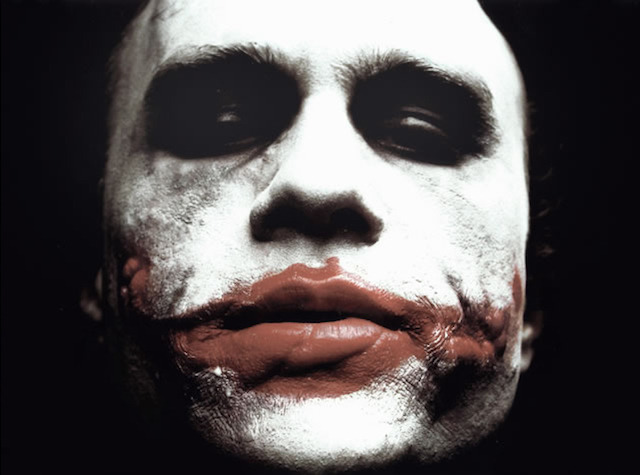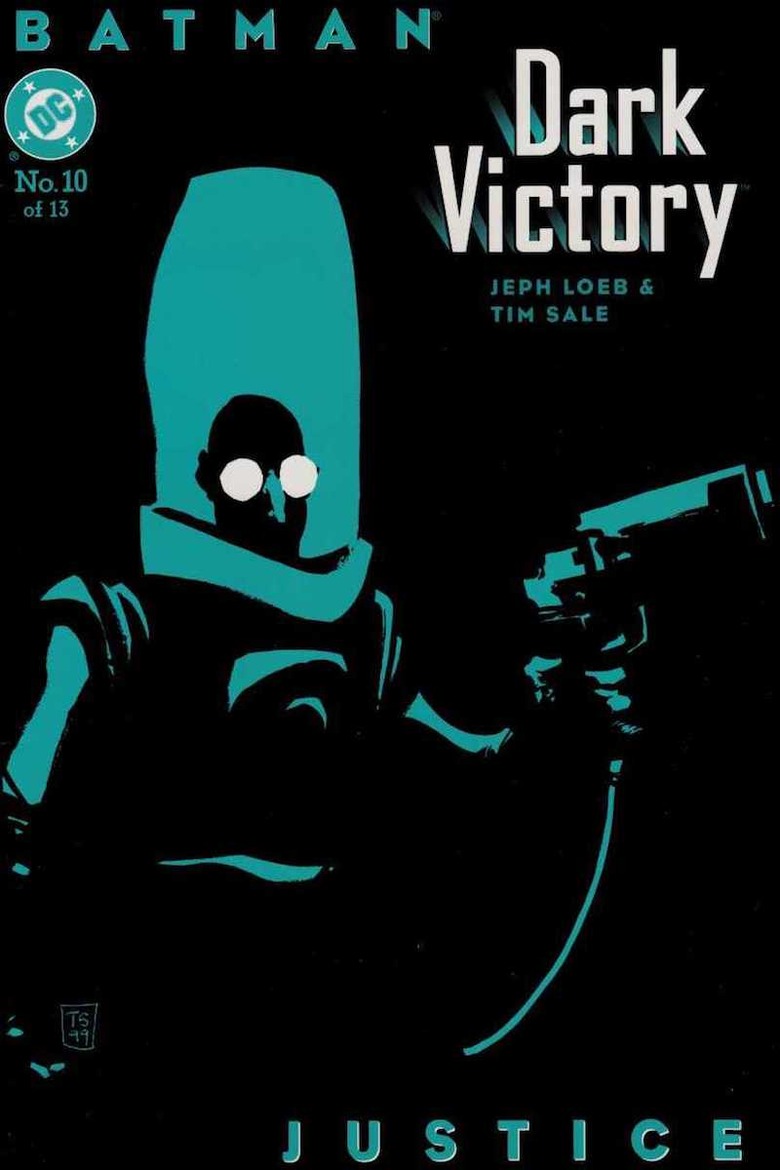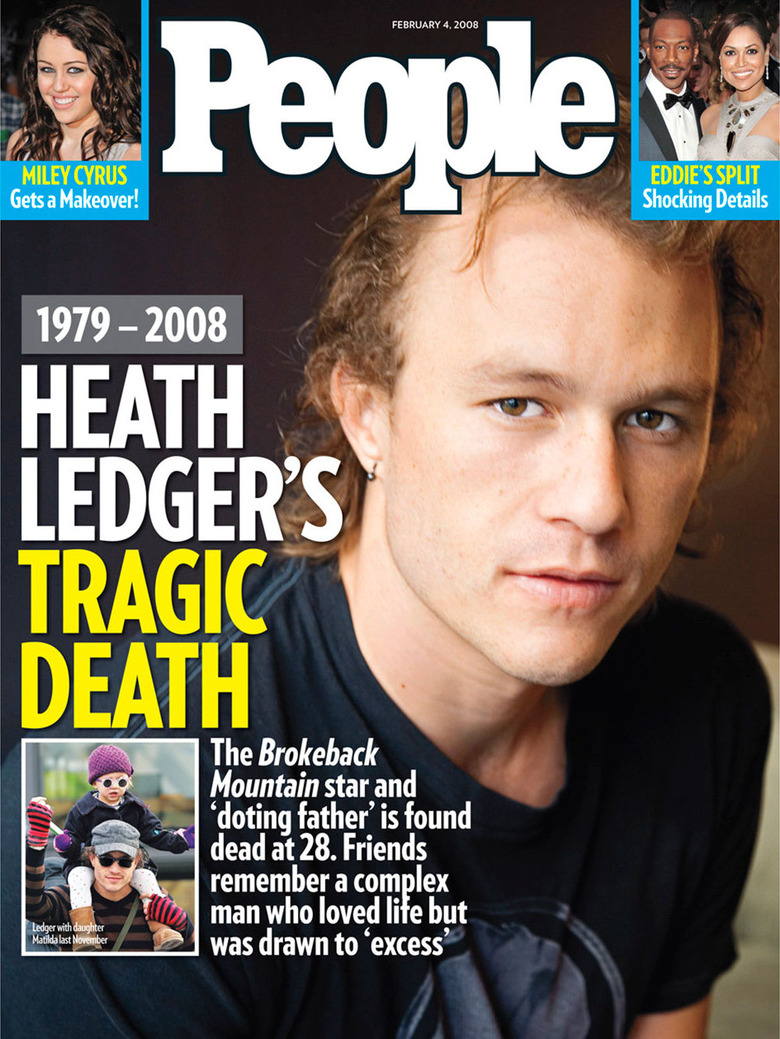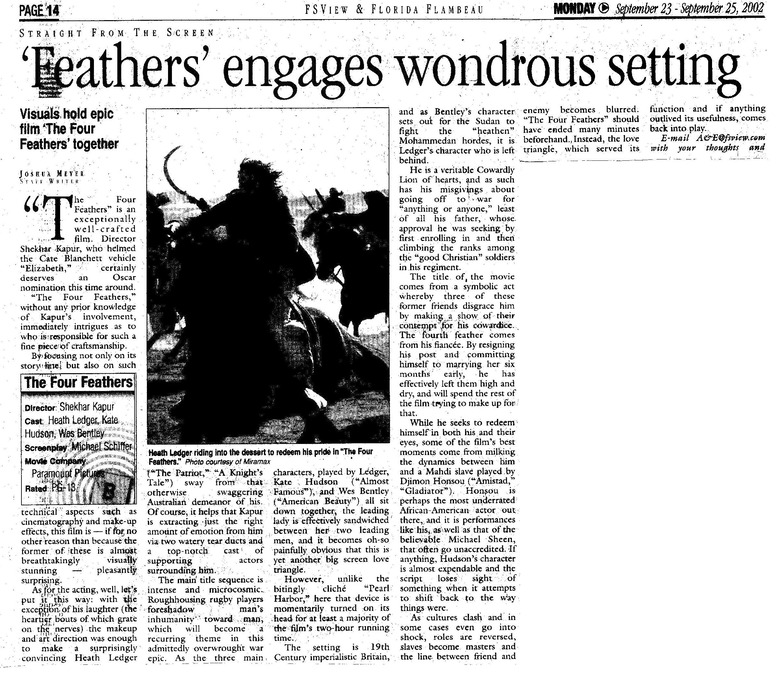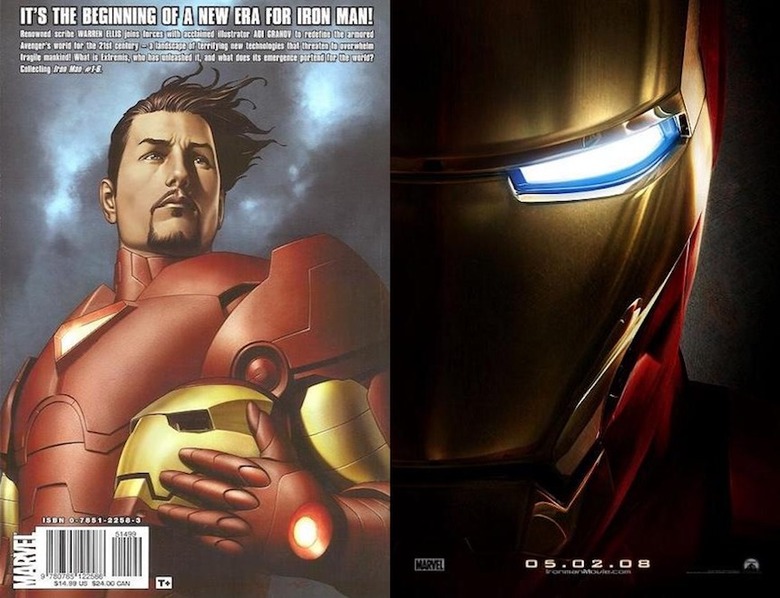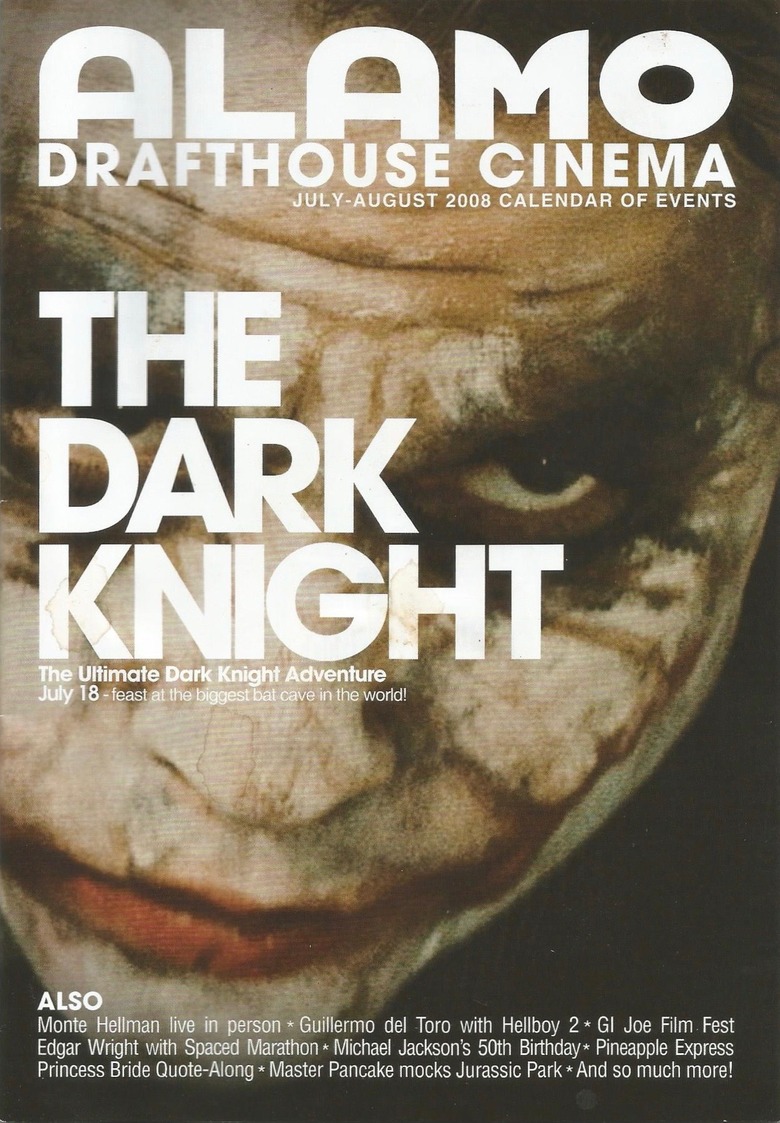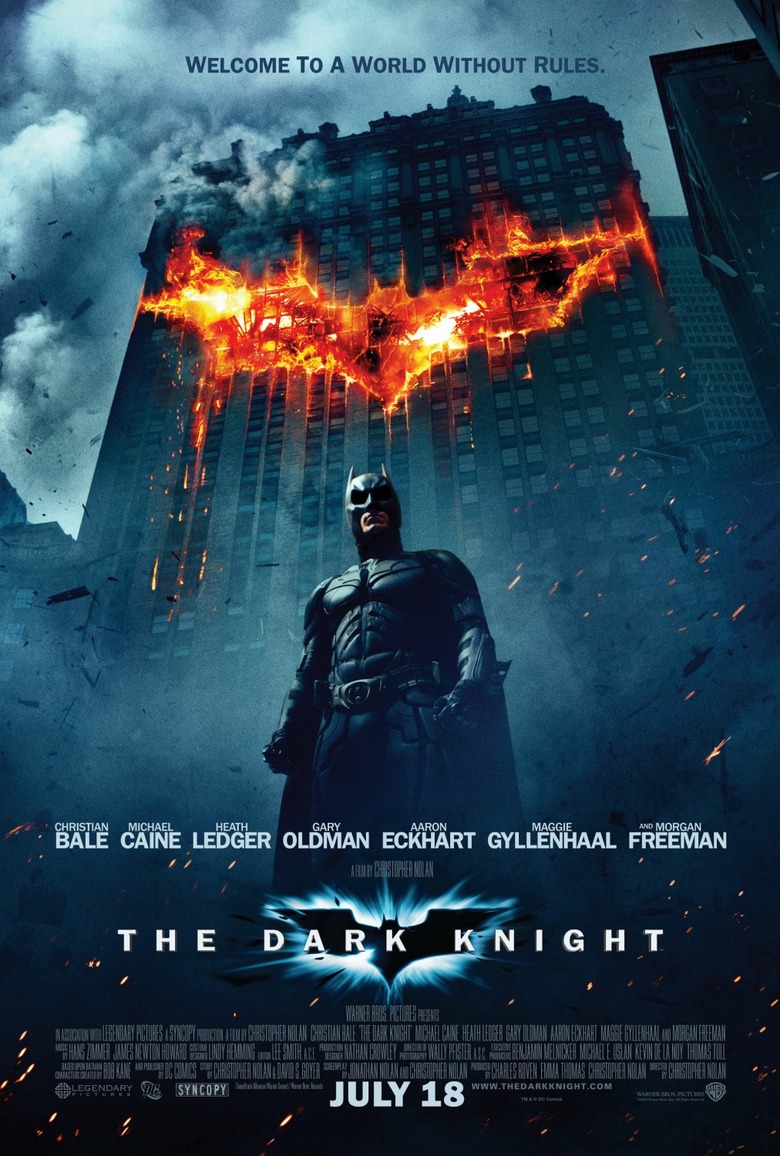From Fanboy Fanatic To Writer: A Deeply Personal History With 'The Dark Knight'
(Welcome to The Dark Knight Legacy, a series of articles that explore Christopher Nolan's superhero masterpiece in celebration of its 10th anniversary.)
Seeing Heath Ledger in real life on a Manhattan talk show stage. Dressing up as the Joker for Halloween. Receiving a text from a friend in a parked car the night news of Ledger's death broke. Dressing up as the Joker again for the movie's midnight premiere. Seeing the movie eight times in the theater. Driving to Austin that summer and witnessing the world's largest urban bat colony fly out from under a bridge at dusk.
These are among my own personal experiences with The Dark Knight. I can't speak for everyone but I'd venture to say there are a lot of other movie news nerds out there with memories related to the film's development and how it intersected with their own lives from 2007 to 2008. Outside the movie theater, the real-world experience of The Dark Knight was its own kind of adventure: a juggernaut of hype that delivered dark drama and became a billion-dollar cultural phenomenon. This is what it was like to be part of the fan culture at that time, at least for one Batman fanboy who went from being a college dropout to a graduate who now moonlights as a movie blogger.
That Viral Campaign
If you're a regular reader of this site and you've ever taken the time to peruse the History of /Film, then you may have seen where it notes how the site's readership "started to explode in early 2007." Going back to 2000–2001 when I was in college in New York, I can certainly remember checking Dark Horizons for movie news in the computer lab at school. This was back when Darren Aronofsky had been hired by Warner Bros. to write and direct Batman: Year One, a reboot that never materialized. Yet for me, my friends, and maybe whoever else contributed to that later explosion of new readership, 2007 really was the year when we started to get drawn into a daily reading cycle on up-and-coming sites like /Film.
A big part of that had to do with The Dark Knight and its perfect storm of hype-building, which was boosted by its trendsetting viral marketing campaign. Anyone who wants to take a trip down memory lane this week as The Dark Knight celebrates its 10th anniversary will find that the timeline of reveals in that viral campaign is still fully documented here on the site in the archives of old posts written by /Film editor and founder Peter Sciretta. All you need to do is search the tag "The-Dark-Knight" and then go back 40+ pages to where it all started with the casting of Aaron Eckhart and Maggie Gyllenhaal in the movie.
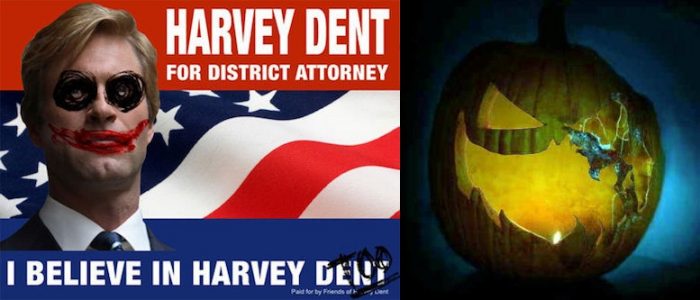
Produced by 42 Entertainment, a creator of alternate reality games (ARGS), the viral campaign involved "over 11 million unique participants in over 75 countries." It really upped fan involvement to unprecedented levels and gave the marketing a new interactive aspect whereby we could unlock glimpses of the movie and its fictional universe online. The first official glimpse that we ever got of Heath Ledger's cut-mouth Joker face was unlocked through a defaced campaign poster for Harvey Dent on a viral site. "I believe in Harvey Dent." That was a line taken from Batman: The Long Halloween, the 13-issue comic book mini-series that also inspired the image of a half-rotting pumpkin with a bat-shaped mouth on WhySoSerious.com.
Who remembers the first teaser poster for The Dark Knight? Or that earth-shattering first trailer in December 2007, which let us see Ledger's Joker move and talk for the first time? Damned if we didn't feed on every last morsel of news related to that movie. As we tracked its development over weeks and months, the movie's viral campaign even involved a nationwide scavenger hunt. There was also one challenge where fans were invited to dress up like the Joker and photograph themselves in front of the most famous landmark in their city.
I didn't need a crazy challenge like that to boost my incentive. I had already dressed up as the Joker and was in the middle of my own "long Halloween" from 2007–2008.
The Joker-ized Josh
As a comic book reader whose collection of long boxes probably peaked around the time of the "Knightfall" saga and the breaking of Batman's back, The Long Halloween was actually my favorite Batman comic. During the run of its sequel, Batman: Dark Victory, I even had a fan letter printed in the back of one issue (#10, the one with Mr. Freeze on the cover, as seen above). It's a rather embarrassing fan letter questioning what I perceived to be a gratuitous number of women-in-lingerie drawings in the panels of the sequel. The editor who responded to my letter on the letters page joked it off by suggesting they merely wanted to do a tax write-off for the lingerie. I had left my own weird, minor mark on the pages of Batman history.
Seeing imagery from The Long Halloween utilized in marketing for The Dark Knight only stoked my anticipation for the movie that much more. It also helped that Batman Begins had quickly become one of my all-time favorite movies—a film I regarded as the best all-around Batman movie because it was actually a true Batman movie weighted toward the title character and not his colorful rogues' gallery.
Of course, I loved the villains, too, and like many '90s kids, the Joker and Two-Face had been my two favorites since Batman: The Animated Series. With the Joker, it went back even longer: I had dressed up as him once for Halloween as an elementary schooler. This would have been 1989. One of the first movies I ever saw in the theater was Batman. I remember patterning my costume that Halloween after the one Nicholson's Joker wore when he and his gang of street mimes converged on the steps of City Hall and he killed the one mob boss with a throwing-dart quill to the neck.
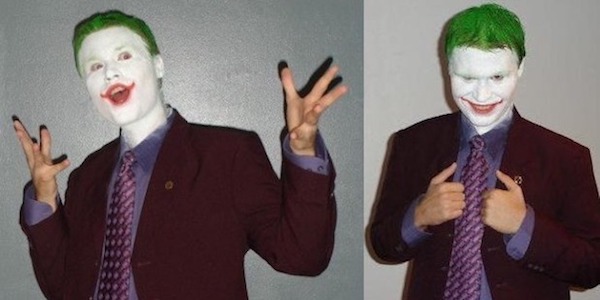
So yeah, eighteen years later, as a young man of 26, I decided to dress up as the Joker again. I was one of those guys. For Halloween 2007, I went out and bought a purple suit and clown make-up, and it seemed like a waste to only use it once, so I actually dressed up again for both the movie's midnight premiere and Halloween 2008. Above, you can see two pictures of that first time back in 2007, when I was still rocking the classic Nicholson Joker look.
Observing the photos above, seeing the half-crazed look in my eye as I posed for the camera, it strikes me as emblematic of the peculiar mania that swept over fandom around the time of The Dark Knight. In 2018, we've all become much more inured to studios feeding us movie marketing in drips and drabs over the course of a year. Analyzing the promotional material, sifting through rumors, and indulging in speculation has become its own self-reflexive sub-culture and cottage industry. But this participatory play game was still something of a novelty back in 2007 and 2008. The Dark Knight came at just the right time when movie fans like me who had grown up watching Michael Keaton's Batman and Jack Nicholson's Joker were now old enough to become news junkies.
I can still remember the feeling of depression that I had after The Dark Knight's midnight premiere as I filed out of the AMC shopping mall theater in my Joker costume. The movie had been spoiled for me by a leaked plot description that I stumbled upon online before I learned to be wary of spoilers. However, if The Dark Knight can be viewed as instrumental in shaping the modern movie news cycle, then in a way, this deflated feeling was a fitting end.
The Day Heath Ledger Died
Where were you the day Heath Ledger died? It's crass to quote survey results, but the magnitude of the effect his untimely passing had on pop culture can perhaps be better understood when you consider that it was voted 2008's top entertainment story in a survey of U.S. newspaper and broadcast editors conducted by The Associated Press. As one of the many people who became a fan of Ledger during his short career (over and above being a lifelong fan of the Joker), his death was one of those time-stopping events where I'll always remember where I was and what I was doing that day.
I say "day" but actually, it was nighttime when I heard the news. I had just parked my car in the lot of a Mexican restaurant on the Tennessee Strip in Tallahassee, Florida, right across the street from Florida State University. One of my friends had texted me while I was driving, but I didn't pick up my phone and look at the text until I had parked and the keys were out of the ignition. The text read simply, "Heath Ledger dead at 28." As it happens, /Film's obituary carried the same headline.
I thought it was a sick joke at first. I was a college kid with a flighty brain and I think that friend of mine had a history of playing pranks, so maybe, because I was in a hurry to get inside and eat dinner, the gravity of the text didn't fully register. The restaurant was one of those fast-casual chains where you move through the line and watch your burrito being assembled. It didn't take long for me to get my meal and when I was finished, I went back out to the car and called one of my other friends. The significance of the text — the possibility that it wasn't just a prank — had begun to sink in and on the phone, my friend confirmed that the news was real. Heath Ledger was dead.
Of all the shocking celebrity deaths, Ledger's hit close to home for me on a number of levels, none more so than the fact that I had observed him in-person once at a live taping of The Daily Show with Jon Stewart. This was in New York City, on one of my last trips into Manhattan back in the spring of 2001.
Having attended a liberal arts college in Bronxville for three semesters, I was preparing to transfer back to my home state of Florida to finish up my undergraduate education in what I thought would be a timely fashion. Ledger was in the studio that day doing an interview to promote A Knight's Tale. You can watch that interview over on the official Comedy Central website. I was one of the people in the background making noise with the rest of the audience.
Suffice it to say, the interview, which touched comically on Ledger's "sheep-jousting" background in his hometown of Perth, was funny but also slightly antagonistic at times. Ledger was fidgety — an old soul still uncomfortable in his new skin, perhaps — and Stewart kept taking these little digs at the 22-year-old Australian heartthrob, as if he was venting his microaggressions through jokes. I almost wondered if something had happened between them backstage to get them off on the wrong foot. Immediately after the interview, when Ledger had left the stage and Stewart was interacting with the audience off-camera, I remember one woman in the studio bleachers saying she thought Ledger was nervous. Stewart said something to the effect of, "We can't all get by on our good looks alone."
He couldn't have known, of course, what was to come. At the end of that year, Monster's Ball would open in New York and L.A., showcasing Ledger's first memorable dramatic performance as a despondent correctional officer living with his hateful father, played by Billy Bob Thornton. By then, I would be back down in Florida, earning Cs and Ds already in my first semester at FSU because I was lazy and bored with math and science electives and I didn't know what I wanted to do for my major. Ledger's Daily Show interview wouldn't actually air until four days after I had bid the Big Apple farewell.
College Dropout, Media Fallout
When Ledger suddenly died in 2008, I still hadn't graduated from college, though I had followed his career, writing a review of The Four Feathers for my college newspaper, among other things. Forget being a fifth-year senior. By 2008, I was a 9th-year senior.
As someone who was only a year younger than him, it was humbling to think about all this great actor had accomplished in his life by the age of 28. Besides building up a DVD collection and being a college dropout for a few years while working a series of dead-end jobs in the food-service industry, my biggest claim to fame was that I had co-written and recorded a bunch of songs and played a couple shows with one of my bands at a local college bar.
I'm sure many fans had a healthy, normal relationship with the movie, but how many other Dark Knight obsessives like me turned to the movie to fill some hole in their lives? As morbid and wrong as it sounds, Ledger's death added a deeper dimension to the pre-release news cycle for the movie. Simply put, it caused a worldwide media sensation. His last days, the circumstances of his death, his acting process, the reactions of industry professionals who had worked with him, became the subject of intense fascination around the globe. Now suddenly there were all these stories from major news outlets floating around out there in addition to the ones being posted on movie blogs. Juicy Fox News headline: "Jack Nicholson Says He 'Warned' Heath Ledger."
Slowly but surely, an air of Hollywood legend started to grow up around The Dark Knight. The death of a crew member during production (special effects technician Conway Wickliffe, to whom the movie was co-dedicated along with Ledger), compounded by Christian Bale's arrest before the London premiere and Morgan Freeman's car crash in August 2008 even had people saying the movie was cursed. Ledger's tragic death, meanwhile, took on the mythic status of an actor driven to an early grave through sleepless nights brought on by the channeling of genius.
Even if he hadn't died, his actual performance as the Joker would have ensured him a place in the pantheon of great movie villains. But the fact that he did die young immortalized it even further. He became an icon, this generation's James Dean, someone Creative Writing majors like me (I was back in school by 2008) latched onto and used as the hagiographic subject of our assignments in Poetry class. James Franco wasn't the only one penning odes to Ledger. To this day, I would still have to credit Brokeback Mountain with being one of the first pieces of media to expand my worldview as a WASP beyond its previously homophobic borders. As it turned out, repressed longing (for a better life) was something I could relate to very much.
Bottle It and Sell It
In 2008, my brief stint writing for the college newspaper was long since behind me. This was back in the Stone Age of journalism, when it seemed like having physical newspaper clippings of recent articles you had written (as opposed to just links you could send to well-crafted posts) was necessary for a portfolio. Beyond the occasional workshop assignment in school, the most constructive thing I was able to do with writing about movies was to present a paper related to the upcoming Iron Man film at my university's international Film and Literature Conference.
2008 wound up being the Year of the Comic Book Movie, though of course, none of us had any inkling that a full-fledged Marvel Cinematic Universe was on the way. I was just happy to be able to parlay my love of comic books into a speaking engagement where I was admittedly out of my depth, surrounded by all these academics, PhDs who had traveled in from other countries and were asking the baby-faced undergrad tough questions about Iron Man during the Q&A session. The theme of the conference was regional and global posthumanism. Technically, Tony Stark could be considered a cyborg if you're familiar with his origin and changes that were made to the character in the 2007 graphic novel Extremis.
Outside of the two classes a semester I was taking, I was working full-time to support myself. Movies had largely become a passive form of entertainment that helped me vegetate after work. My friends and I used to have some lively discussions about new releases and we joked that if we could just somehow bottle and sell the discussions we were having, they'd surely hold entertainment value for others. We had no frame of reference for online radio, you see. Podcasts were not yet such a widespread thing. As noted in the History of /Film, the /Filmcast did not launch until late May 2008.
If only my friends and I had the foresight to start a podcast or set up shop on YouTube. I had all this pent-up film-loving energy with no outlet for it and maybe that's why I was so obsessed that I dressed up as the Joker three times and went to see The Dark Knight eight times in the theater. It was fun and memorable, but as I look back, it also feels like there were times in my twenties and even later, into my thirties, when my consumerist fanboy habits waylaid me and resulted in misdirected creative energy.
Over the years, I had absorbed all this otherwise useless information about movies and unlike Heath Ledger, I was not some highly functional genius able to synthesize that into a legendary career. Privately, I had all these creative projects that I had started but never finished. It left me restlessly worshipping on the altar of cinema, which I believe has been and is potentially the highest art form, but which can also function as the great dung heap of civilization at times.
Movies were my golden calf, like Mooby in Dogma. Maybe that's why I made the pilgrimage to Austin that summer to see the bats and visit the Alamo Drafthouse.
The Bats of Austin
I don't even remember how I got the idea to drive to Austin. At the time, I think I was still reading Ain't It Cool News, an Austin-based site, and maybe they had something on there about the Alamo Drafthouse. The name recognition for this theater chain has increased even more in subsequent years (last year, for less than desirable reasons) but it was new to me then, and my imagination was sufficiently regaled by the idea of a place like the theater pubs of Portland, Oregon where you could eat and drink while you watched new movies. In addition to holding a special screening of The Dark Knight in a real-life bat cave outside the city, they had quote-along screenings of classic films and all these other cool theater events and it almost made the place seem like a movie mecca that I needed to visit at least once in my life. Farting around aimlessly online one day probably led me down the Wikipedia rabbit hole to Austin.
That year, I had spent my spring break volunteering in New Orleans as part of the ongoing Hurricane Katrina recovery effort. I wanted to go back to the Big Easy, so I hatched a plan to drive from Florida's capital to New Orleans to San Antonio and the capital of Texas, following a similar path to the one Jon Favreau's character would take years later after Favreau had moved on from directing Iron Man movies and returned to his indie-drama roots with Chef.
In Austin, there's a bridge leading into the downtown area known as the Ann W. Richards Congress Avenue Bridge. This bridge houses the world's largest urban bat colony. At twilight, tourists gather to see the bats flying out from under the bridge. It's a majestic sight, like something out of Batman Begins, to see these squeaking creatures drop out of the bridge's dark crevices and take to the sky in undulating waves. For me as a 27-year-old, it was a spiritual experience, sort of a real-life Batman pilgrimage, one that helped reawaken my interest in travel. (My extremely shoddy camerawork in the clip above doesn't do it justice.)
Because of the timing of my trip, I didn't end up getting to attend a bat-cave screening of The Dark Knight in Austin. Instead, it was Wanted, another comic book movie released that summer, starring James McAvoy, Angelina Jolie, and Morgan Freeman, that I wound up seeing at the Alamo Drafthouse on Sixth Street. In a way, this choice ended up being more significant, because at the end of the movie (spoiler alert), when McAvoy's loser turned assassin looks right at the camera and asks the audience, "What the fuck have you done lately?" I felt like he was speaking to me directly.
A Decade After The Dark Knight
One of the most useful pieces of advice that I heard not so long ago as an aspiring entertainment writer actually came from a source that should be familiar around these parts. It was something the illustrious David Chen, host of the /Filmcast, said on one of his podcasts.
As I remember it (poorly, no doubt), he was talking about how online writing and/or podcasting about pop culture had gotten to be a much more crowded market now than it was when he got started with the /Filmcast all those years ago during the summer of The Dark Knight. He said something to the effect that the best piece of advice he could give for a content creator who wanted to make a career out of it in today's oversaturated market would be to merge himself or herself with an existing brand.
This extends well beyond blogging, of course. It's what we've seen happen in Hollywood more and more in recent years as the mid-range drama has disappeared and directors and actors have increasingly linked themselves up with established franchises. Would Christopher Nolan have been able to make Inception, Interstellar, or Dunkirk had it not been for his success with the Batman movies?
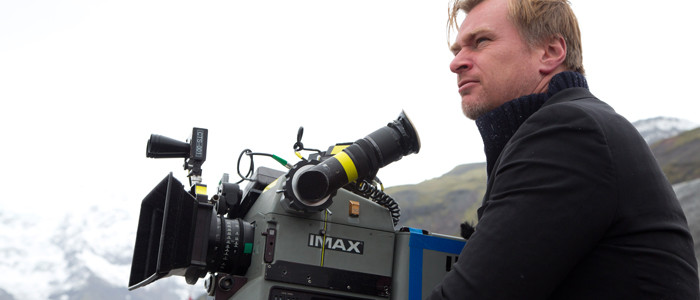
One of the first /Film articles I wrote last year was a piece about why Nolan was the quintessential filmmaker of the 2000s. That article was the fulfillment of a dream over a decade in the making.
I don't know if The Dark Knight outright invented the modern movie news cycle. I know it did that for me but I wouldn't presume to apply my own truth universally. I do know, just from talking to people and reading what others have written, that there's a legion of fans out there, each of whom probably has his or her own autobiographical Dark Knight tale.
I guess the point of this long, navel-gazing one of mine is that The Dark Knight inspired me before I even knew what to do with that inspiration — how to funnel it into productive pursuits and not just let it wither on the vine. He was just a person, flesh and blood like the rest of us, but Heath Ledger's light is one that burned brief, bright, and brilliant in this world, like the Fourth of July fireworks going off behind Ennis Del Mar in Brokeback Mountain. If there's any burden of responsibility that falls upon the living, it's to use the gifts you've got and to make something of your life, not let it be squandered.
Whatever else The Dark Knight might be, it's not an exaggeration to say this movie changed my life. There's never been another movie, not even a Star Wars movie, that I went to see eight times in the theater. The experience leading up to The Dark Knight is a big part of what led me to where I am today.
Hopefully, this story has served as an effective time capsule. Maybe some other reader and future writer out there will find it useful.

